|
“We
need water; nothing else will do"
David
Brooks 2002.
We
are pleased to present you this new issue of the EMS
bulletin celebrating the International Environment Day,
June 5, 2003.
On
this occasion we are also pleased to present an
interview with Claudio Langone, newly appointed
Executive Secretary of the Brazilian Ministry of
Environment.
In
recent months, we were greatly pleased by two remarkable
achievements. In
the first place, UNICEF and WHO awarded a prize to the
Brazilian city of Sao Bernardo do Campo for the
outstanding social results obtained with the "Waste
and Citizenship" program, developed by the POLIS
Institute and the Secretary of Environment of that city.
One of the remarkable outcomes of the program comes from
the Integrated Management of Urban solid waste research
project, granted by IDRC through the Small Research
Grants mechanism administrated by the EMS.
The
second achievement took place in Canada, at the National
Round Table on the Environment and the Economy, with the
participation of IDRC.
A proposal was presented to include in the next
Federal budget six new formal statistics indicators for
sustainable development: i. forest cover, ii. freshwater
quality, iii. air quality, iv. greenhouse emissions, v.
extent of wetlands, vi. educational achievement. These
indicators would complement other more familiar economic
data - such as the consumer price index (CPI) and the
GDP. The EMS is championing this new approach among
Ministers of Environment of LAC countries to start a
round of comments on this initiative.
Unfortunately,
in the same period many LAC cities were devastated by
heavy rainfall causing landslides in the Bolivian small
mining town of Chima and floods in the Province of Santa
Fe, Argentina. Both
events resulted in human loss and economic devastation
in the region. Simultaneously, industrial chemical
spills in the Brazilian central rivers caused serious
damage to natural fresh water resources.
The 2002 report of the International Red Cross
declares: The
EMS, in an effort to tackle municipal constraints to
manage environmental emergencies, is developing a new
instrument called SIGA, for the prevention of natural
disasters. A summarised description of this instrument
is illustrated in the section on EMS New Findings for
Policymakers.
It
is a well-known fact that South America is one of the
richest groundwater reservoirs of our planet. Despite
their extensive use, knowledge on the subject tends to
be limited. In May, a specific project funded by GEF was
presented. It aims to build capacity on the integrated
groundwater management of the Guaraní Aquifer system,
by Mercosur member countries. The EMS, linking this last
initiative to the conclusion of the recent Global Water
Forum held in Japan, launches its new Small Research
Grant Call attempting to join efforts to
institutionalize the sustainable use of fresh water
among local stakeholders in LAC cities. The terms of
this call will be released soon.
We hope that most of you are able to participate.
Once
again, our deep appreciation to those of you who
contributed to this very special issue.
Walter
Ubal Giordano
EMS
Executive Director
|
INTERVIEW:
THE ENVIRONMENTAL CHALLENGE OF THE NEW BRAZILIAN GOVERNMENT
|
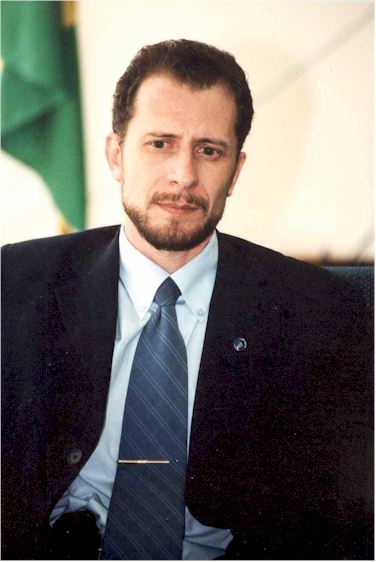
|
Several
years after the Rio 92 Conference and right after the
Johannesburg 2002 Summit, what is your view about the
whole process?
We
are lagging behind with reference to the implementation of
a sustainability agenda at the international level. The
World Summit on Sustainable Development (Rio+10, in South
Africa) was affected by two important defeats. One was a
political defeat, given that no significant advances were
obtained and most resolutions and final documents are tied
up to international trade agreements, which is a back step
if compared to Rio 92. The other defeat was structural;
therefore, it is clear that the role of the United Nations
needs to be reconsidered, together with the way these mega
events should be conducted in order to produce concrete
results. I believe that the role of countries such as
Brazil, under the guidance of Luiz Inácio Lula da Silva s
government and Minister Marina Silva, is to make alliances
in the international arena, breaking the polarity of the
G8 x G77 and being able to reassume the implementation
process of the sustainability agenda, isolating delayed
positions. Therefore, Brazil will have to be consistent
with its position at the global level through the
effective implementation of its proposals in the internal
sphere. This is a challenge to Lula's government. |
|
Dr.
Claudio Langone
Executive
Secretary – Brazilian Ministry of Environment and Member
of the EMS Technical Advisory Committee |
The
implementation of Local Agenda 21 in Latin America has shown
uneven results. What is your vision on this, and what
initiatives is the Brazilian Ministry of Environment pursuing
for its implementation?
In
connection with Agenda 21, we need to face the great task of
moving from the discourse to the implementation phase. Rio+10
could not meet this objective. We believe in “bottom–up”
processes that are framed within local logics. We have
identified many positive sustainability initiatives at the local
level, especially in developing countries, that have shown
creativity to devise and implement alternatives that bring along
social inclusion and environmental protection. With reference to
the national Agenda 21--already approved and consolidated--, we
will promote local and regional instances to build local
sustainability agendas. One of the instruments to reach that
goal will be the 1st National Conference on Environment, to be
held by the end of November 2003, in Brasilia (DF).
What
is the Brazilian Ministry of Environment proposing to tackle the
problem of environmental vulnerability and risk prevention in
low-income populations?
This
subject is extremely important given that it links environmental
protection with environmental justice. We need mechanisms to
reduce inequality in the access to natural resources. We have
the problem of natural disasters, affecting more intensively the
less favoured populations, in peripheral regions, mountain
slopes and similar areas. In addition, we have also considered
the problem of environmental accidents, highlighting those
caused by chemicals and oil by products. Brazil is working
together with the Ministry of the Cities in order to create a
program to prevent
risks from natural accidents and to consolidate a national
prevention system for environmental emergencies related to
pollution.
What
is the new Brazilian Environmental Policy proposing to
articulate legislation at the local, provincial and national
levels, in particular regarding the relationship between your
Ministry and the new Ministry of Cities?
We
understand that the Brazilian legal model is very interesting.
Brazil is a federative country, with specific responsibilities
and great autonomy among the different government levels. We
will work to strengthen those processes through a shared and
decentralized environmental management mechanism, where part of
the responsibilities will be carried out through the partnership
of different government spheres.
The other part will be decentralized and will require a
clear definition of competences. For that purpose, we will continue with local training, in
order to implement a national program for local management
improvement. At the same time, the cities will be encouraged to
take on more responsibilities in the environmental area, working
in coordination with the new Ministry of the Cities -- a great
improvement of Luiz Inácio Lula da Silva’s government--, with
the specific goal of dealing with urban problems.
The
Brazilian government is promoting a new dialogue between South
American and North American and European countries regarding
trade issues. What initiatives will Brazil pursue in order to
establish similar negotiations on environmental issues?
Brazil
cannot refuse to play a leading role in the articulation of a
sustainability agenda at the international level. We will take
advantage of the position of Minister Marina da Silva as
President of the Latin-American Forum of Ministries of the
Environment. We are actively participating in the discussions
around FTAA with a critical vision, because the inclusion of
Brazil and developing countries in the international context
must take place in a way that guarantees their sovereignty and
interests. Brazil has great power of articulation with mega-diverse
countries. Working together we can put pressure on other
governments and institutions in order to move forward towards a
real sustainability agenda. In that sense, strengthening of
United Nations-related agencies becomes necessary in order to
reassume the world dialogue on a different basis. Global
interests on sustainability must be placed above trade interests,
and not the other way round.
Would
Brazil be willing to participate in a regional meeting to
discuss the main issues to be included on an agenda leading to
the establishment of regional environmental policies and
legislations?
Certainly.
Brazil has a very advanced model in terms of
environmental legislation as well as in the organization of
management systems. We want to set up cooperation mechanisms,
especially with countries in Latin America, not only to support
their capacity-building processes, but also to learn from more
updated specific policies that are in place in other countries.
Our active participation in Mercosur relies on our understanding
of the need to strengthen the bloc. It is a high priority of the
current government to strengthen our alliances between Latin
America and developing countries.
EMS-IDRC
is exploring with Ministries of Environment and Development of
the region, the establishment of round tables to discuss the
inclusion of sustainable development indicators in their
respective national budgets, to monitor the state of the
country. Would
it be feasible to implement this proposal in Brazil?
We
are discussing this subject thoroughly, building up on the
accumulation consolidated in Brazil. The Ministry of Environment
is preparing a specific seminar on that subject with national
and international experts. In the second semester of this year,
we will launch an initiative called Dialogues for Sustainability,
with the participation of well-known individuals such as Fritjof
Capra, Vandana Silva and others. The subject of indicators will
be a high-priority topic during the discussions at the 1st
National Conference on Environment, which will be preceded by a
wide national mobilization, with pre-conference instances in all
States.
EMS
AGENDA AT A GLANCE
In
the last issue of INFO-EMS, this section illustrated the general
contents of the 2003 EMS agenda. We were then presenting our
vision on new emerging environmental issues affecting urban
areas of LAC. Now,
we are presenting urban stakeholders, LAC local governments,
civil society, research centers, private and public enterprises,
with a detail of future activities on Sustainable Development,
promoted by the EMS, and we invite them all to participate.
The
first item in our agenda refers to Small Competitive Grants for
applied research geared to municipal governments.
After a long round of consultation with our partners and
EMS constituents we concluded on its contents and focus on the
proposed subject. For
the 2003 call we defined “Multi-sectoral Alliances for the
Sustainable Management of Water in Cities of Latin America and
the Caribbean” as the uppermost topic of interest for local
policy makers. We propose that research conducted on this issue
be focused from a specific perspective: that of
institutionalizing multi-stakeholder participatory local
practices to build up long-term policies.
We invite all municipal governments interested in taking
part, to download and fill in the electronic form so that we can
forward them details on the terms of the call.
http://www.ems-sema.org/encs/ech/enc_eng.htm
In
July, the EMS will be present at the International Fair and
Congress of Cities URBIS 2003, following a special invitation of
the Sao Paulo City Government.
The
second point of our agenda refers to a regional workshop to
develop a set of environmental indicators for the effective
evaluation of the state of the environment.
A country from Latin America and the Caribbean will be
taken as case study to validate it in the regional and
international context. A local environmental indicators expert
from Environment Canada will direct this workshop. We invite
local municipalities wishing to participate to download the
following form: www.ems-sema.org/encs/formind/
|
Landslide
in Chima, Bolivia
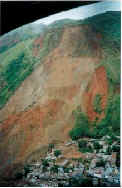
Photo:
Francisco
Lara de CYTED XIII
|
Indicators
are key elements in management, apart from being effective
instruments that provide transparency in policy decision-making
and urban environmental risk assessment.
Latin America and the Caribbean experience some
gaps in this regard. Although risk prevention ranks high
in the agendas of insurance companies operating in LAC,
the development of urban environmental prevention systems
by municipalities, to face natural or man-made disasters,
is less developed. This
factor became evident during the recent disasters caused
by landslides in Chima, floods in Argentina, etc..
The
closing point of the agenda will precisely tackle this
issue of environmental disasters in vulnerable urban areas
and the applicability of different prevention systems, in
a forum featuring SIGA.
To this end, the EMS together with the Mining
Policy Research Initiative (IIPM-MPRI) of IDRC is studying
the possibility of applying SIGA as a prevention system in
the case of small mining activities.
This will allow for the consolidation of the
thematic approach proposed by Cristina Echavarría (MPRI)
and Roberto Villas-Boas (CYTED XIII), during their
participation in Geneva in the course of the meeting on
the APELL Programme and Mining of the UNEP.
www.uneptie.org/pc/apell/events/miningworkshop.html
This
technical forum organized by the EMS will gather regional
and international experts and will promote a holistic
approach to face environmental risks through integrated
systems that could be incorporated by regional municipal
authorities. We invite all stakeholders; municipal
technical experts in particular, research centers and
researchers to send their requests to participate in this
event.
www.ems-sema.org/encs/formSIGA/ |
ONGOING
INITIATIVES
|
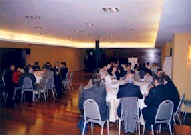
Course
Workshop on Clean Development Mechanism
Photo:
MVOTMA
|
Within
the context of national activities leading to the
application of the Clean Development Mechanism (CDM) of
the Kyoto Protocol, and with support of the Government of
Canada and EMS-IDRC, the Climate Change Unit of the
Ministry of Housing, Land Management and Environment of
Uruguay, held a series of studies on institutional
conditions and capacities for the application of the
mechanism. The results of the studies, as well as the
portfolio of potential CDM projects in Uruguay, were
presented and discussed at a workshop called by the
Climate Change Unit, on 24-25 April 2003. More information:
www.cambioclimatico.gub.uy
|
Initiating
the activities of the project on Management of Environmental
Risk in Low Income Human Settlements in Urban Areas in Central
America, coordinated by EMS-IDRC and IADB and executed by FEMICA,
Engineer Victor Manuel González Vásquez was recently appointed
as Project Coordinator.
More
info: www.femica.org/Noticias/noti_proyectosema.htm
On
April 7, 2003, on the occasion of the Brazilian celebrations of
World Health Day 2003, UNICEF and the President of Brazil
handed the WHO award to Mr. William Dib, Mayor of Sao Bernardo
do Campo, State of Sao Paulo, for the outstanding results of the
"Waste and Citizenship" program.
Remarkable
outcomes of the program result from the "Integrated
Management of Urban Solid Waste Impact and Potential"
research project granted by the EMS/IDRC
http://www.ems-sema.org/english/act/0619sanbernardo.html
Last
March, EMS research officer Alicia Iglesias Peralata,
participated at the Colloquium on Strategies for Local Action 21
in Latin America and the Caribbean called by ICLEI and GTZ in
Sao Paulo, Brazil. The colloquium focused on strategies to
accelerate implementation of Local Action 21 in the region. Its
participants were representatives from international agencies
and municipal authorities (mayors) of cities of the region.
Among them, the Mayor of Ñuñoa presented the “Carta de Ñuñoa”.
http://www3.iclei.org/lasc/carta_municipalidades_latinoamericanas.htm
Mr.
Shaun Bona, Regional Controller of the IDRC LAC Regional Office,
during his Evaluation tour in Central America visited IDRC
corporate project on Sustainable Development and Participatory
Ecosystem Management in the Valley of Palajunoj in
Quetzaltenango, Guatemala. He produced a very satisfactory
assessment of the institutional and technical settlement of the
project.
In
April, on the occasion of his visit to Brasilia, Walter Ubal,
EMS Executive Director, presented the 2003 Agenda of the
Secretariat to Mr. Claudio Langone, Executive Secretary of the
Brazilian Ministry of Environment. He also met the Minister, Mrs.
Marina Silva, on the occasion of the Brazilian Climate Change
Forum 2003 held in Brasilia. Both authorities expressed optimism
to implement a Memorandum of Understanding between both
institutions.
EMS
NEW FINDINGS FOR POLICY MAKERS
SIGA:
Integrated Environmental Management System for Vulnerable Areas
in Latin America and the Caribbean
|
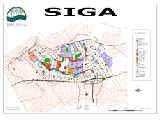
|
Within
the framework of its activities supporting municipal
management in Latin America and the Caribbean, the EMS (Environmental
Management Secretariat) is in the process of preparing a
Manual for the Environmental Management of Vulnerable
Areas based on the application of what we have called the
Integrated Environmental Management System (in Spanish
SIGA). The manual was created by consultants Eng. Álvaro
González Gervasio and Geographer Gabriela Fernández (School
of Science, UDELAR). |
The
Latin American continent is becoming a frequent scenario of
environmental risk and disasters of different origin and
intensity that often occur in succession.
Although
some situations draw more attention due to their intensity (earthquakes,
volcanic eruptions, tropical cyclones) and the damage and loss
they cause, there is a whole range of threats and vulnerability
situations that affect our continent and occur due to slower and,
therefore, less perceptible processes.
In any case, these phenomena are felt by and have an
impact on the urban areas and affect society as a whole and, in
particular, those sectors that form the so-called “vulnerable
populations” due to a combination of political, economic,
social, cultural and geographical factors.
At
the same time, the rapid and unplanned pattern of growth of the
Latin American cities, with its consequent environmental and
social problems, contributes to reinforce the fact that local
governments are not prepared to effectively face these disasters
on their own. In
particular, we would like to stress the need of those
municipalities located in areas of high environmental risk, and
repeatedly hit by natural disasters, to obtain technical support
and attention from regional as well as international
organizations.
The
SIGA constitutes a guide for municipal technical experts as it
enables them to design their own tools based on the
systematization, processing and combination of different types
of territorial information from different sources: the physical
and natural environment, ecological, socio-economic information,
etc. It is an instrument of support for municipal management,
suitable for territorial analysis, as well as for environmental
planning focused on prevention and reduction of risks in
vulnerable areas.
www.ems-sema.org/castellano/act/siga.html
Use
of Information and Communication Technologies (ICTs) in
environmental management by municipalities of the Mercocities
Information
and Communication Technologies constitute a strategic component
in Sustainable Urban Management. Access to Environmental Information is a citizen’s right
and an essential condition to promote and guarantee effective
and genuine participation in the decision-making processes
regarding environmental policies. Within the framework of the
agreement between the Mercocities Network and the EMS signed in
2001, a research study was carried out on the use of ICTs for
environmental management by the Municipalities in the network.
The study identified interesting aspects of the use of these
technologies in the analysis, monitoring and management of
environmental issues. Although municipal governments have
initiated IT processes for administration and accounting
purposes, most of the municipalities of the network are
committed to assuming a proactive role in spreading ICTs and
accessibility to the Internet among the poorer sectors, thus
becoming fundamental actors in the struggle to reduce the
digital divide. The
main findings show that although 76% of the municipalities have
a Web page, only 46% have a page dedicated exclusively to
disseminating information of their Environment Division and, at
the same time, the quality and depth of the information,
channels and services offered are very different in each case.
There are four large groups of pages:
first, the basic institutional pages, second, sites which
can be called reference centres, publishing information on
local environment, documents, statements, environmental
laws and codes, third, the
Information Systems publishing up-dated
information on environmental monitoring, Environmental
Atlases, geo-referenced mapping, etc. and finally, the
Participation and Services Platforms with an environmental
profile.
This study
was conducted by B.A. Alén Pérez Casas, within the framework
of an agreement signed between the Mercocities Network and EMS,
with the support of the Municipality of Montevideo. www.ems-sema.org/mc/
NEW
UNDERTAKINGS
V
Specialized Meeting of Mercosur Municipalities and Town Halls
The
V Specialized Meeting of Mercosur Municipalities and Town Halls
(REMI – Reunión Especializada de Municipios e Intendencias)
took place on May 20, 2003 in Asunción, Paraguay, with the
presence of delegations from Argentina, Brazil, Paraguay,
Uruguay and Bolivia.
Among
the resolutions adopted at the meeting, it was decided to create
a Technical Office in Montevideo, in response to the need to
strengthen and improve REMI’s work. Given that the Standing
Technical Secretariat of the Mercocities Network (STPM) is
located in Montevideo, its Council offered to house the
Technical Office for REMI in the same city, providing the
support and experience of the STPM. www.mercociudades.org
|
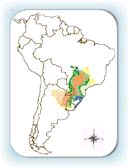
|
Environmental
Protection and Sustainable Development of the Guaraní
Aquifer System
The
governments of Argentina, Brazil, Paraguay and Uruguay,
launched the Guaraní Aquifer System Project at a
technical seminar held in Montevideo, at the end of May
2003.
The
27 million dollars project, jointly supported by Global
Environment Facility, the World Bank and the Organization
of American States, will assist Argentina, Brazil,
Paraguay and Uruguay to work together in the elaboration
and implementation of a common legal, institutional and
technical framework for the management and preservation of
the Guaraní Aquifer System, within the framework of
sustainable development principles.
This
trans-boundary aquifer system underlies the four countries,
has a total surface extension of 1.2 million square
kilometers, constituting a strategic fresh water resource
in the southern cone. In the long term, this project is
expected to benefit the 15 million people living in the
aquifer region by helping maintain a sustainable supply of
safe water for humans; high-quality water for industry; a
sustainable supply of thermal water for tourism,
industrial, and municipal uses; and reduce conflict
potential resulting from the use of the Aquifer waters in
trans-boundary areas.
www.sg-guarani.org
|
Early
Warning Hemispheric Plan for Latin America, the Caribbean, the
United States of America and Canada
Around
one hundred experts from the United States, Canada and other
countries from Latin America and the Caribbean met in Antigua,
Guatemala, on June 3 to 5, to define a hemispheric position in
preparation of the Second International Early Warning Conference,
to be held in October 2003 in Bonn, Germany.
The
Regional Consultation on Early Warning studies an initiative on
alert systems based on public policies applied throughout the
Americas. The
objective is to have guidelines and examples that could be
presented as a hemispheric contribution to the Bonn conference.
www.eird.org
CITY
PRESS
EVENTS
– PROFESSIONAL OPPORTUNITIES – COURSES
Find
detailed information: www.ems-sema.org/english/evts/
Disseminate
your activities through our website by filling out an on-line
form:
www.ems-sema.org/english/noticias/city_press.htm
or send an e-mail: info@ems-sema.org
PROFESSIONAL
OPPORTUNITIES
Chief,
Water Resources, Development and Management Service
FAO
- Rome, Italy - Deadline: 19/06/2003
Forestry
Officer
FAO
– Rome, Italy - Deadline:
23/06/2003
Environment
Officer
FAO
- Bangkok, Thailand - Deadline: 03/07/2003
Environmental
Affairs Officer
UN
CITES – Geneva, Switzerland - Deadline: 08/07/2003
Regional
Coordinator West Asia
UNEP
- Deadline: 08/07/2003
Senior
Program Officer - Environmental Conventions
UNEP
- Nairobi, Kenya - Deadline: 22/07/2003
Associate
Programme Management Officer
UN
- Nairobi, Kenya - Deadline: 26/07/2003
CONFERENCES
AND EVENTS
LATINAMERICAN
SUMMIT ON LOCAL DEVELOPMENT AND DESCENTRALIZATION
9-12/06/2003.
Arequipa, Peru
III
LATINAMERICAN CONGRESS ON MANAGEMENT OF HYDROGRAPHIC BASINS
9-13/06/2003.
Arequipa, Peru
V
INTERNATIONAL SEMINAR/WORKSHOP: WATER, ENVIRONMENTAL HEALTH AND
COMMUNICATIONS
18/06/2003.
Santiago de Chile, Chile
V
INTERNATIONAL SYMPOSIUM ON WATER
23-27/06/2003.
Cannes, France
IX
INTERAMERICAN CONFERENCE OF MAYORS AND LOCAL AUTHORITIES
24-26/06/2003.
Miami, Fl, U.S.A.
AMAZONIA,
CITIES AND WATER GEOPOLITICS
25-27/06/2003.
Belém, Brazil
ENVIRONMENTAL
AND NATURAL RESOURCES ECONOMISTS LAC CONGRESS
9-11/07/2003.
Cartagena de Indias, Colombia
INTERNATIONAL
FAIR AND CONGRESS OF CITIES – URBIS 2003
22-25/07/2003.
San Pablo, Brazil
III
INTERAMERICAN CONGRESS ON AIR QUALITY
23-25/07/2003.
Canoas, RS - Brazil
COURSES
COURSE
ON PUBLIC-PRIVATE PARTNERSHIPS 14/07/2003 - 08/08/2003.
Washington DC, USA
POSTGRADUATE
COURSE ON ENVIRONMENTAL EDUCATION
05/08/2003
- 9/12/2003. Buenos
Aires, Argentina
10th
ANNUAL INTERNATIONAL COURSE
ON
WETLAND MANAGEMENT
19/08/2003
- 01/10/2003. Lelystad,
The Netherlands
|



